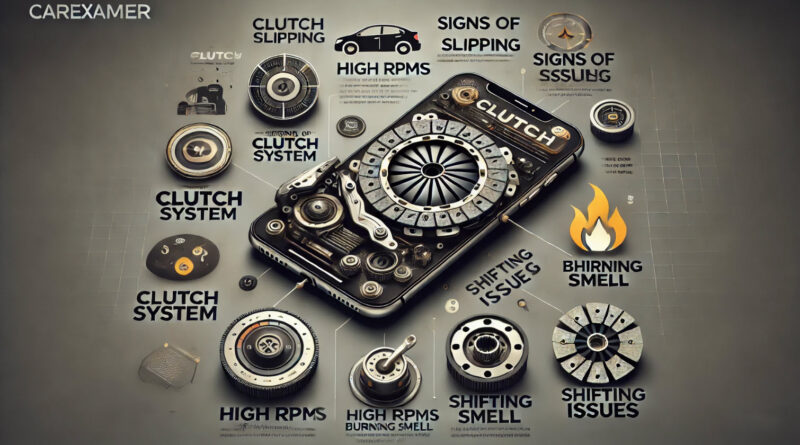Signs Your Clutch Is Slipping and What to Do About It
Let’s dive into the signs that your clutch is slipping and what you can do to fix it before it causes more serious damage. If you’re driving a manual car and notice it’s not performing like it used to, especially when accelerating or shifting gears, you might be dealing with a slipping clutch. This is one of those car problems that can sneak up on you but could turn into a bigger headache if left unchecked.
What Does It Mean When a Clutch Slips?
In a manual car, the clutch is what connects the engine to the wheels, allowing you to shift gears smoothly. When your clutch starts slipping, it means the connection between the engine and wheels isn’t solid anymore. The clutch isn’t fully gripping, and that can lead to poor acceleration, difficulty shifting gears, or even engine damage.
1. Your Car Revs, But Doesn’t Accelerate
One of the most common signs of a slipping clutch is when your engine revs up, but the car doesn’t seem to go any faster. This usually happens when you’re accelerating, and it feels like the car is struggling to keep up with the engine’s power.
What to Watch For:
- You press the gas, the RPMs shoot up, but the car barely picks up speed.
2. Burning Smell
If you catch a burning smell when you’re shifting gears, it could mean your clutch is overheating. This happens because the friction between the clutch disc and flywheel is too high, often due to slipping.
What to Watch For:
- A strong burning odor when shifting, especially after driving up a hill or in heavy traffic.
3. Hard Time Shifting Gears
Having trouble getting your car into gear or feeling like the gear stick is fighting you? This could be another clue that your clutch is slipping. When the clutch isn’t fully engaging, the transmission struggles to switch between gears.
What to Watch For:
- The gear stick feels stiff or it gets stuck between gears.
- The car jerks when you change gears.
4. Clutch Pedal Feels Soft or Squishy
If your clutch pedal feels different—softer, spongier, or you notice it engages much higher than usual—that’s another sign of clutch trouble. This could mean the clutch isn’t properly engaging with the flywheel.
What to Watch For:
- The pedal feels soft or easy to press.
- The clutch engages right away, without needing to press the pedal very far.
5. Weird Noises When You Shift Gears
Unusual noises when shifting, like grinding or squealing, often point to clutch issues. The sounds are caused by the clutch not disengaging smoothly, leading to friction and struggle when shifting.
What to Watch For:
- Grinding or squealing noises when shifting.
- Squeaks when pressing or releasing the clutch pedal.
6. Car Struggles on Hills
If your car has trouble maintaining speed or acceleration when going uphill, that’s another sign your clutch may be slipping. Hills put more strain on the clutch, and if it’s worn out, you’ll feel it here.
What to Watch For:
- The car struggles to maintain speed uphill or when carrying heavy loads.
- High engine revs with little power response.
7. Shuddering When Starting from a Stop
If your car shakes or vibrates when starting from a complete stop, especially in first gear, this could mean your clutch isn’t gripping well enough. The shuddering comes from the clutch struggling to engage smoothly.
What to Watch For:
- The car vibrates when you release the clutch in first gear.
- The car doesn’t feel smooth when starting from a stop.
Why Is My Clutch Slipping?
A clutch can slip for several reasons. Some of the most common causes include:
- Worn Clutch Disc: Over time, the clutch disc wears down, losing its ability to grip the flywheel properly.
- Oil Contamination: If oil leaks onto the clutch, it reduces friction, causing the clutch to slip.
- Broken Clutch Springs: These springs hold the clutch in place. When they wear out or break, the clutch can’t engage fully.
- Incorrect Adjustments: If your clutch isn’t adjusted correctly, it may not engage or disengage as it should.
What to Do If Your Clutch Is Slipping
If you think your clutch is slipping, here’s what you should do:
- Get It Checked by a Mechanic: The sooner you get a professional inspection, the better. They’ll be able to tell you if the clutch needs adjusting, repairing, or replacing.
- Replace Worn Parts: If the clutch disc, pressure plate, or flywheel is worn out, these parts will need replacing. It’s best to replace all worn components at once to avoid future issues.
- Check for Leaks: If oil is leaking onto the clutch, the mechanic will need to fix the leak and clean or replace the affected parts.
- Drive Smart: To keep your new clutch in good shape, avoid riding the clutch pedal, revving the engine too high, or carrying heavy loads frequently.
Final Thoughts
A slipping clutch can be a real hassle, but catching it early can save you from bigger headaches (and costs) down the road. If you notice any of the signs mentioned above—like high revs, a burning smell, or trouble shifting gears—take your car in for an inspection right away. The sooner you get it checked, the better chance you have of fixing the problem before it gets worse.
Buying a used VW. Buying used vauxhall, BMW, Jaguar, Ford, Volvo, Range rover, Bentley, Aston Martin, Porsche, Ferrari, Lamborghini, Maserati, Hyundai, Tesla, Honda, Pagani

